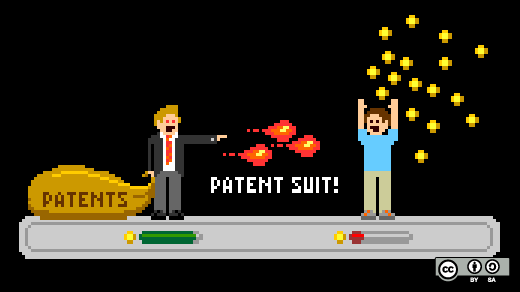This morning the New York Times published a front-page story on software patents. My wife got to the paper before I did, and as I got coffee she told me the story would make me happy. She also said it was too long for a normal busy person to read in its entirety. It is long, but I am happy to see that the closest thing we have to a national newspaper of record is getting the word out about the dysfunction of the patent system.
The story by Charles Duhigg and Steve Lohr is titled "The Patent, Mighty as a Sword." It starts with the misfortune of Michael Phillips, an innovator in the area of voice recognition technology who was sued by a competitor for patent infringement. "The millions of dollars Mr. Phillips had set aside for research and development were redirected to lawyers and court fees." Although a jury eventually found the patent was not infringed, defending the lawsuit cost $3 million, and this drove Mr. Phillips out of business. He was planning to leave the voice recognition area for someplace with a "less treacherous patent terrain."
There's no way to know how many similar stories there are of software patents discouraging or preventing innovation. But the Times points to evidence that Mr. Phillips is not an isolated case, and that both individual innovators and technology companies are hamstrung by the patent system. It reports that the number of patent lawsuits has "almost tripled in the last two decades." The number of patent applications has risen by more than 50 percent in the last ten years. "As much as $20 billion was spent on patent litigation and patent purchases in the last two years—an amount equal to eight Mars rover missions." Apple and Google spent more last year on patent litigation and patent purchases than on research and development.
The Times story describes the impossible work of patent examiners, who are charged with approving or rejecting applications based on about two days of work. "The patent office routinely approves patents that describe vague algorithms or business methods, like a software system for calculating online prices, without patent examiners demanding specifics about how those calculations occur or how the software operates. As a result, some patents are so broad that they allow patent holders to claim sweeping ownership of seemingly unrelated products built by others. Often, companies are sued for violating patents they never knew existed or never dreamed might apply to their creations, at a cost shouldered by consumers in the form of higher prices and fewer choices."
That's bracingly pithy. There's more—on absurd patents, on the use of patents by large technology companies to stifle competitors, on disputes that discourage small entrepreneurs, and the paralysis in Congress that has so far prevented major reforms that would address these problems. It's worth reading and forwarding to friends.







7 Comments